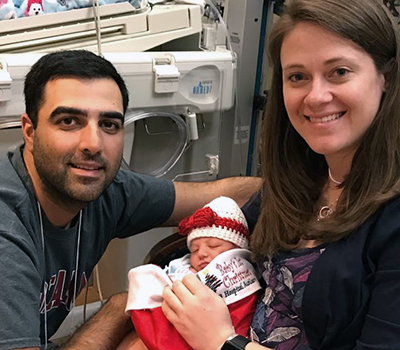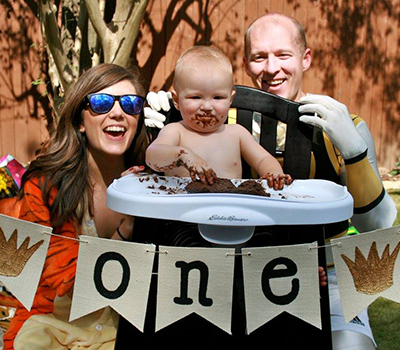by Allison Rogers, PGY2, and Madeline Eckenrode, PGY2
In an era where many female physicians choose to postpone starting a family, we have many residents who are balancing the demands of both motherhood and medicine. We sat down with three of them to find out how they do what they do. Sarah Bagwell is a Med/Peds resident from Dallas, Texas, who's currently in her third year. She has a four-month-old son, Charles Michael. Stacey Watkins is a second-year resident from St. Louis, Missouri, who just had a daughter, Nora Katherine Bahraini, in December. Ellen Wills is a third-year resident from Nashville, Tennessee, who has a one-year-old son, Jackson Weldon.
What was the most surprising thing about coming back from maternity leave to work?
SB: I was surprised by how long it takes to get ready in the morning to leave for work all day, not to mention how many bags you have to bring with you to work!
EW: Returning to work after maternity leave was challenging, and I knew it would be, but I think I was surprised at how much it changed the way I related to patients and their families. I returned to oncology wards and I remember having a patient with a 2 yr old daughter. She was adorable and sweet and she would visit him often. This patient received a terminal diagnosis and had to be transferred to the MICU for closer monitoring and likely intubation. The patient was tearful as he had not yet had a chance to say good bye to his daughter. He was worried that once he was intubated he may never wake up again. It was the first time in a long time I cried in a patient room. While this would be tragic to anyone, I think I really saw myself in the patient's position and how I would feel lying that bed. It was a very important and humbling experience.


Left: Stacey Watkins with Nora Katherine and husband Nima. Right: Ellen Wills with Jackson and husband Brad
What guidance or advice that you received from mothers in medicine has been the most useful?
SB: I have been reminded many times that what has worked for others may not work for me and my son. It is best not to compare yourself to others. We are working hard to balance being good physicians and mothers.
EW: Actually, it was from a father. He told me to never apologize or feel bad about being a parent. And that being a parent to the person I chose to bring into this world was just as important as being a doctor, and to never forget that. It’s something I repeat to myself often and has helped me balance residency and home.
SW: It has been great to have people available to get advice on some of the basics including child care (nanny vs daycare), pediatrician, maternity clothes shopping, residency scheduling, expectations during the different trimesters, etc. I think in this situation you need to rely on the experience of others. My family/nanny will be able to help me with the day to day issues but when it comes to working out details as they relate to work and balancing personal life/work, I have really appreciated talking with other resident/attending mothers. She isn't here yet so I assume I will be bothering the other mothers more after she arrives!
In what ways have you felt supported by the program?
SB: The attendings and house staff have been so supportive of me coming back from maternity leave - whether it was asking how I was doing or how baby was doing or allowing me to show one more cute picture or just understanding when I have to leave for a minute to take care of business (aka pump).
EW: None of my co-residents ever made me feel guilty or bad about how me becoming pregnant might make things harder or complicated for them. I remember I was on a 28hr call for GI/Onc the week before I gave birth and Chris Small was on renal/pulm. When Chris realized I was on he came over to oncology and did 2 admissions for me so that I could lay down. It was amazing and incredibly thoughtful. That is just one example of many.
SW: I have only ever felt supported during this time. I was very scared to tell the program but when I went to talk with Dr. Morris, he was so wonderful when he heard the news. It is obviously an overwhelming situation as residency is hard enough on its own and adding this additional responsibility only adds to the stress. However, having co-residents, program directors and support staff that only want to help you through this makes all the difference. I have never felt like I have burdened the program with this pregnancy. I am guessing it also helped that the chiefs knew I was pregnant before they finished making the schedule for this year so not much shuffling had to occur! As Dr. Willet has repeatedly told me, a child is a blessing whenever it happens and that is what I keep reminding myself.
What are your career goals? Have they changed since you became a mother?
SB: I want to do outpatient med-peds. The predictability of a clinic schedule has definitely become more enticing now being a mother, but in general I knew I was meant for primary care from the start as I truly cherish the relationships with my patients.
EW: I want to be a geriatrician, and that has not changed. I have amazing role models within our department here on how to have a fulfilling career and still be a great parent.
SW: That is a great question that I keep wondering how my career plans may or may not change once I become a mother.
How have patients responded to your pregnancy?
SB: I have a few sweet patients in my continuity clinic who saw me several times throughout my pregnancy as well as after my son's birth and they have been very supportive and wanted to hear all about Charles.
EW: In my primary care clinic, I actually have a few that always remember that I had a son. When I returned from maternity leave, they wanted to see pictures and ask about how my family was doing. Almost all my patients reacted very positively.
SW: It's definitely a conversation starter! I have had a couple people touch my stomach uninvited which was not the most wonderful thing to experience but other than that patients often just ask questions and are interesting in hearing the details. I had one patient get very upset and worried about me when he developed shingles during his hospital course and I had been in his room multiple times during its development. In general, people care about my well-being which is surprising when I am the one trying to take care of them.
How has being a doctor affected your role as a new mother? Do you think you are more laid-back than your peers when it comes to your child, or do you think, knowing the worst-case scenarios, that you tend to worry more?
SB: Honestly, I feel like I am a little bit of both depending on the scenario. Since I am Med-Peds, I generally am not too worried about the run of the mill stuff - spitting up, fevers, runny nose, teething, etc. However, since I have seen a lot of sad cases in the hospital that most parents don't know could happen, I worry more about those things happening.
EW: Honestly I am not sure how being a doctor has affected me as a new mother – it’s the only experience I have had. I will say compared to some of my friends I seem a little more laid back about germs and playing with dirt. I think my husband's job in orthopedics, where he sees lots of pediatric trauma, scares me more. Football spinal injuries, ATVs, falling out trees, passenger on motorcycles ... the list goes on.